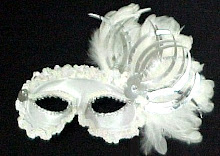
WILLIAM SHAKESPEARE
(1564-1616)"To be or not to be" is among the many great lines penned by William Shakespeare. Shakespeare is considered to be one of best playwrights of all time. He wrote an estimated 37 plays, including Romeo and Juliet, Hamlet, and Macbeth. Despite having been written hundreds of years ago, Shakespeare's work remains popular because of his engaging characters, intricate plots, and artful dialogue.
Shakespeare was born in Stratford-upon-Avon in 1564. His exact birth date is a bit of mystery, like many aspects of Shakespeare's life. While the exact date wasn't recorded, it has been commonly accepted as April 23. His father was a glove maker and an important man in the town. Shakespeare attended school for a time and it is thought that some of his studies in classical poetry, plays, and history inspired his plays.
It is believed that Shakespeare left school around the age of fourteen, which was not uncommon at the time. He married Anne Hathaway in 1582 when he was eighteen years old. The next year they had a daughter named Susanna. The Shakespeare family grew again in 1585 with the birth of twins named Hamnet and Judith.
Nothing is known for certain about what Shakespeare did between 1585 and 1592. There are stories that he joined a theatrical company or that he worked as a schoolteacher. Whatever the case, Shakespeare had become known as a dramatist and an actor in London by 1592. Some of his early works include Titus Andronicus and The Two Gentleman of Verona.
A deadly outbreak of a disease known as "the plague" forced many theatres to close their doors in the early 1590s. Shortly thereafter, in 1593, Shakespeare had his first work, the narrative poem entitled Venus and Adonis. Shakespeare would later earn great praise for his sonnets, a type of poem with three four-line sections and a pair of lines at the end, all following a special rhyming scheme.
The theaters reopened in 1594 and Shakespeare returned to the stage as part of a troupe called Lord Chamberlain's Men (later the King's Men). He stayed with this group as a dramatist, an actor, and a part-owner for many years. In 1599, the company built the Globe, a theater near London. Shakespeare wrote some of his greatest tragic and comedic works around this time. He created Hamlet, Othello, King Lear, and Macbeth as well as Twelfth Night and Measure for Measure here. Shakespeare's works were so popular that even Queen Elizabeth I of England had them performed for her.
In his later years, Shakespeare returned home to Stratford-upon-Avon around 1610 to 1613. Shakespeare died on April 23, 1616. Since his death, there has been some speculation whether he really wrote all of the plays himself or they were written by a group of people. Some have even questioned whether he really existed at all. The mysteries surrounding Shakespeare may never be solved, but there is no arguing about the lasting impact of the plays and poems attributed to him.
© 2006 A&E Television Networks. All rights reserved.
Related WorksPlays 1589–93 The Two Gentlemen of Verona 1590–3 The Taming of the Shrew 1590–4 King Edward III (with others) 1590–2 Henry VI Part 3 1590–1 Henry VI Part 2 1590–1 Titus Andronicus 1591–2 Henry VI Part 1 (with others) 1592–3 Richard III 1592–4 The Comedy of Errors 1593–5 Love's Labour's Lost 1594–5 A Midsummer Night's Dream 1594–5 Romeo and Juliet 1594–6 Richard II 1594–6 King John 1596–7 The Merchant of Venice 1596–7 Henry IV Part 1 1597 The Merry Wives of Windsor 1597–8 Henry IV Part 2 1598–9 Much Ado about Nothing 1599 Henry V 1599 Julius Caesar 1599–1600 As You Like It 1600–1 Hamlet 1601–2 Twelfth Night 1602–3 Troilus and Cressida 1604 Measure for Measure 1603–4 Othello, The Moor of Venice 1603–5 All's Well That Ends Well 1604–7 Timon of Athens (with Thomas Middleton) 1605–8 King Lear 1606 Macbeth 1606–7 Antony and Cleopatra 1608–9 Pericles (with George Wilkins) 1608 Coriolanus 1609–10 The Winter's Tale 1610–11 Cymbeline 1610–11 The Tempest 1613 Henry VIII (with John Fletcher) 1613–15 The Two Noble Kinsmen (with John Fletcher) Poems 1593 Venus and Adonis 1594 The Rape of Lucrece 1598–1609 Sonnets 1599 The Passionate Pilgrim 1601 The Phoenix and the Turtle











